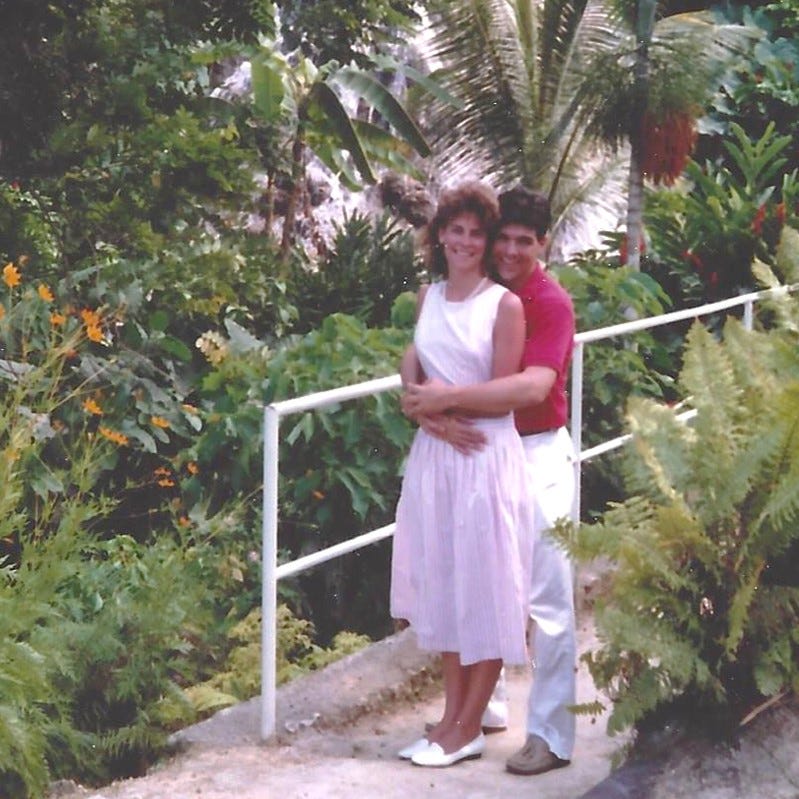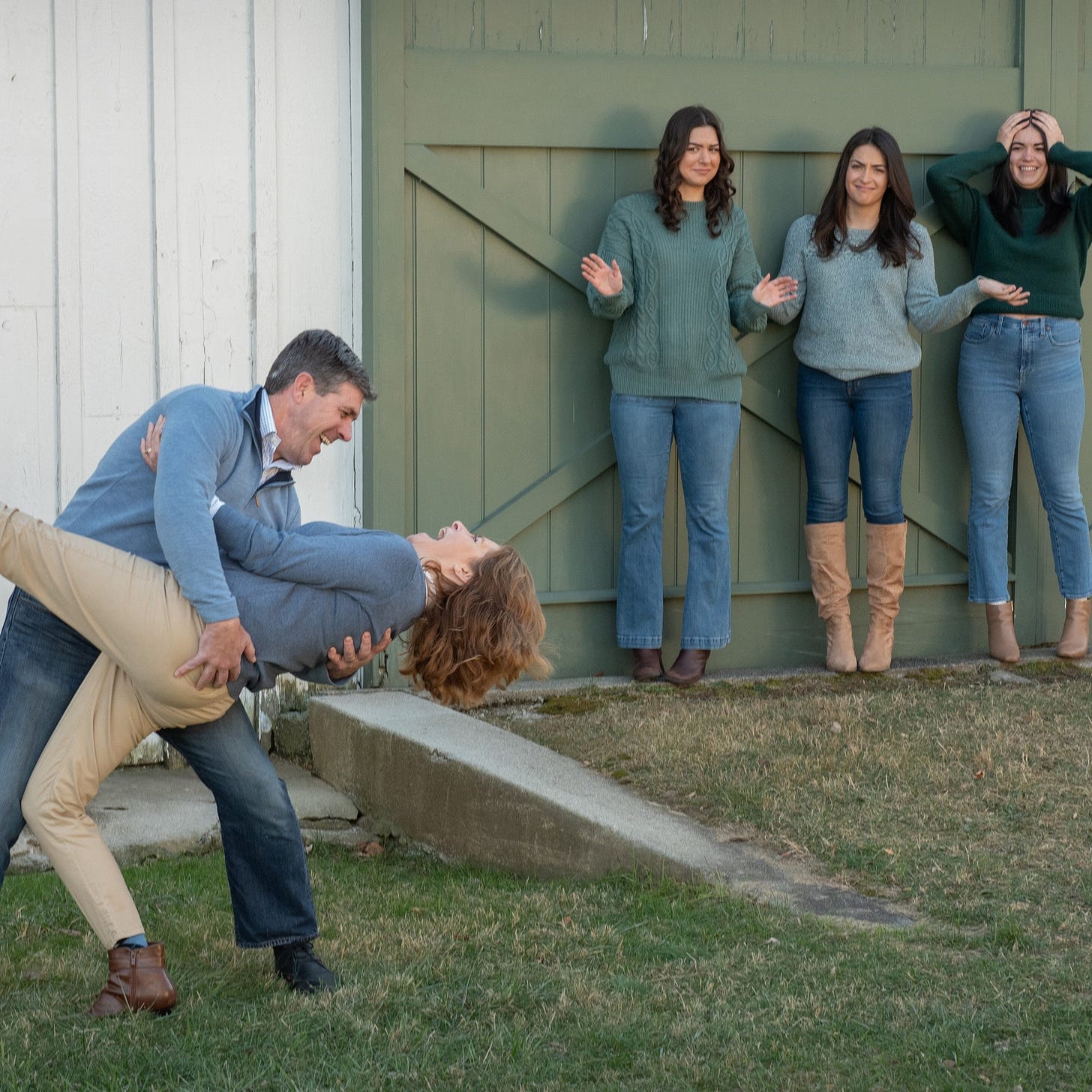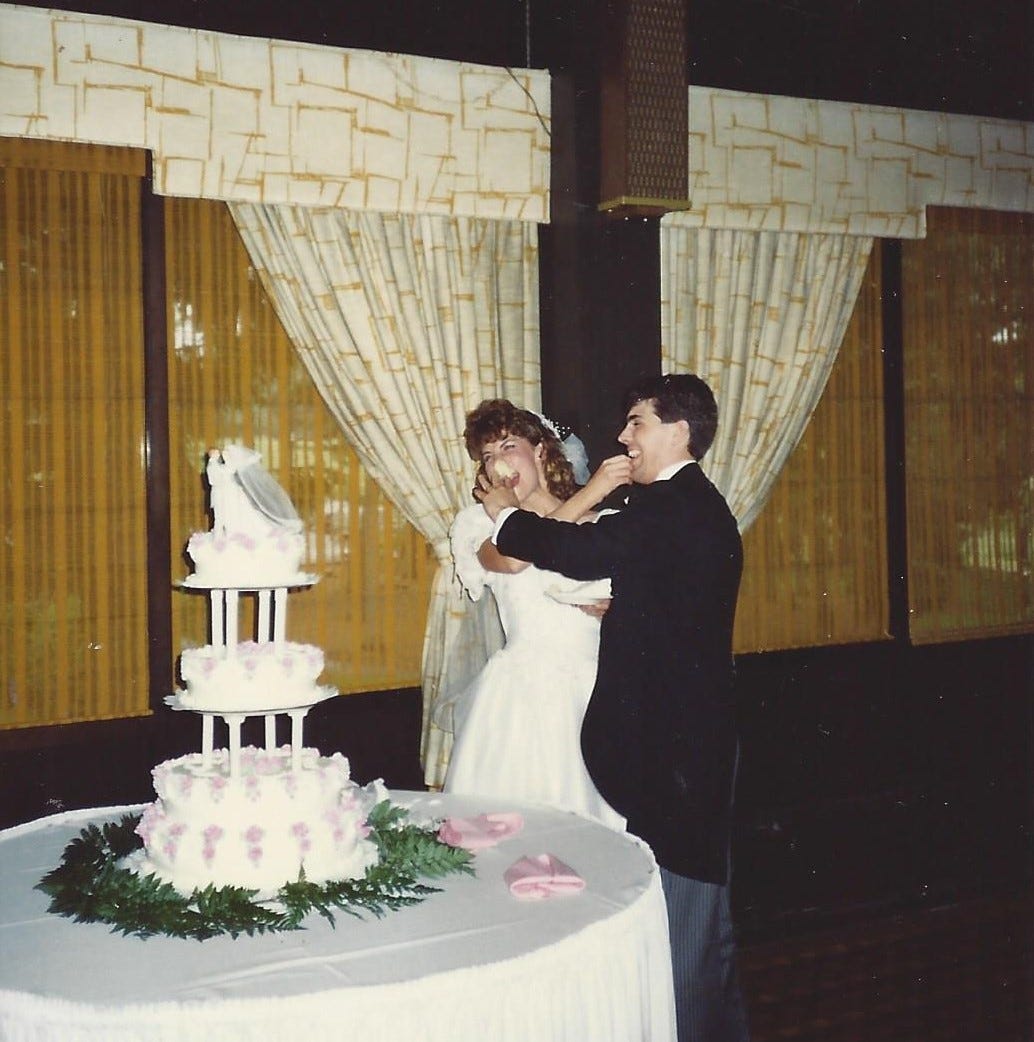Seventy times seven
Why the ridiculous formula for forgiveness is a relationship essential
Dearly beloved, we are gathered here today to rewind my wedding day to replay an incident that I wish hadn’t happened. Since the whole purpose of this newsletter is to tell you about things I didn’t anticipate in the hope that you will be better prepared, we must.
According to the Knot, three out of four wedding receptions feature a cake-cutting ceremony, after which the bride and groom feed each other cake. The custom has been around for centuries in some form or fashion. In more recent times, the tradition devolved into the bride and the groom often trying to one-up one another by smashing the cake into their beloved’s face, with the “winner” being the one who smears more icing on their opponent.
I suppose the cake-smashing trend gained popularity because people found it fun or funny. But not everyone gets a kick out of it. In fact, anecdotal experiences reported in online media recently have even led people to theorize that couples who smash cake are more likely to end up divorced.
At the time we were planning our wedding, I didn’t give much thought to the cake ritual. Although my fiancé and I discussed many, many details about our wedding, we didn’t discuss cutting the cake. I knew of this tradition, but I hadn’t planned on doing any smashing, and I assumed that he was of a similar mind. It was one of those things that I didn’t think we needed to talk about because I assumed that we were on the same page.

For whatever reason, either because he assumed it was something we were going to do, or because he thought it was going to be funny, my husband decided he was going to go ahead and smash the cake in my face.
As you may have already guessed, I didn’t find my husband smashing the cake in my face funny. It made me angry. I couldn’t believe he had done something so dumb. Why would I want cake and icing smeared on my face just in time for one of the reception’s main photo opportunities?
As soon as he saw how upset I was, my husband of course apologized. And I have no doubt that he immediately regretted it.
I wish I could tell you that I had been in the mood to laugh it off. But my new husband caught me at a bad time. Our once-in-a-lifetime day had dawned cool and rainy, and I had had a hard time shaking off the drizzle that had put a damper on my mood.
Since I didn’t want to have the first squabble of our married life in front of 180 people, I resisted the urge to yell or storm off the dance floor. But I was not happy with my new husband.
After retreating to the ladies’ room to touch up my makeup, I attended to the rest of my bridal duties as best I could, greeting guests and hitting the dance floor, but truth be told, my anger was on a low simmer the rest of the day. I don’t know how many people could tell that I wasn’t happy about what had transpired, but hours after the incident when my maid of honor was helping me get out of my gown and into my going-away outfit, she reminded me about what the priest had said in his homily at our wedding Mass about forgiveness.
Although my friend’s reminder didn’t magically erase the incident from my mind, it was enough to help me get a grip on myself so that I didn’t allow the cake smashing to snowball into completely ruining our wedding night and honeymoon. I suppose I was exercising what is known as forgiveness of the will–choosing to accept my husband’s apology even though I didn’t entirely feel like forgiving him yet.

Even after we returned from our honeymoon, my annoyance over the cake-smashing incident hadn’t entirely vanished. Though my husband would have dearly loved to be able to do something to fix it, I was the one who had to make peace with the fact that someone I loved had made a mistake that hurt me.
Since for the most part we can’t choose which emotions we experience, we sometimes have to be patient for the more healing kind of forgiveness–forgiveness of the heart to arrive. Forgiveness of the will opens us up to forgiving with our heart, but sometimes it takes time and grace to get over anger, betrayal, or hurt.
Forgiveness of the heart wasn’t something I could force. All I could do was try to live as harmoniously as possible with my husband in the meantime while I gave my angry feelings some time to recede. I certainly didn’t want one mistake to metastasize into a permanent rift in our relationship.
Eventually my heart caught up with my head, in of all places, a movie theater. A few weeks after our wedding, the movie Ghost premiered. Though the movie about how the spirit of a murdered young man stays behind to warn his lover of impending danger may not have been the highest form of art, it helped remind me about the bigger picture. Yes, some smashed cake had tarnished one of my wedding memories, but my husband and I still had a promising life together to look forward to if I let go of any lingering resentment. And letting go of that resentment is what allowed true forgiveness of the heart to arrive.
I couldn’t tell you whether I’ve reached the ridiculous forgiveness quota that Jesus set way back in biblical times in the 35 years we’ve been happily married since the cake smash. I wasn’t crazy enough to keep count of how many times I’ve had to forgive my husband, and I certainly hope that he hasn’t been keeping track of how many times he’s had to forgive me.
So what was the secret to stopping the cake-smashing mistake from turning into a debacle that harmed our marriage? Making the choice to forgive. If you want to be in a relationship for the long haul, you have to recognize that love is not just a noun that describes a glorious feeling of profound affection you have for someone; it’s also a verb that sometimes requires you to do difficult things like forgiving your beloved.

Though Jesus seemed to be exaggerating when he said you may have to forgive someone as often as seventy times seven, he was on to something
Forgiveness is the necessary grease of social interactions. Without it, you are at risk of depriving yourself of the very relationships you need in your life to make living worthwhile.
Forgiveness is probably the most essential and yet the most underappreciated item in the navigating relationships toolbox
Perhaps you’ve already noticed that you are highly unlikely to get through life without people–even the ones who are closest to you–disappointing or injuring you in some way. In some cases, the injury occurs because of a mistake. Other times, it’s due to a misunderstanding. Sometimes it’s negligence. Sometimes it may even be deliberate. Since there’s no foolproof way for avoiding injury from your fellow humans, you’d better make sure you tuck forgiveness into your emotional first aid kit because sometimes it’s the only thing capable of healing a relationship wound.
Beware of the false remedy of righteous indignation
In the hours and days after some injury has been inflicted on you, you likely won’t be in the mood to forgive–even if the party who has injured you apologizes. During this time, it can be really tempting to crawl into a corner somewhere and lick your wounds. One of the false remedies that the devil likes to pull out of his medicine cabinet and suggest is good old righteous indignation. But be warned: pouring righteous indignation onto your open wound might numb the pain for a while, but it doesn’t do anything to heal you. So beware of spending too much time ruminating about what a horrible person someone else is and/or how wrong they were. It won’t heal you.
Forgiveness is hard because it requires vulnerability, but it’s healthier for you in the long run
Forgiving someone requires you to spend some emotional capital. You have to acknowledge that someone hurt you, and it’s not easy to be vulnerable. You may be tempted to wrap yourself in the armor of righteous indignation because it helps you feel powerful. But the problem is that the armor is awfully heavy to carry around long-term. And it also closes you off to love, trust, and connection. You may think that you’re protecting yourself from being hurt again, but all you might be doing is closing yourself off emotionally, not just from that person, but from other people too. It’s better to drop the armor.
Resentment is a poison that kills from the inside
Be wary of letting your anger turn into resentment. If you become a container holding the acid of resentment, you are at grave risk of eating yourself up.
Sometimes it helps to try to put yourself in the shoes of the person who’s wronged you
Once when I recounted a sorry tale of how I’d been wronged to a close friend, she said something that hadn’t occurred to me about the person who had inflicted the emotional injury–”She's suffering too.” When someone inflicts pain on us, in the aftermath, we tend to forget that the other party has also injured themselves. A little compassion on your part can help open you up to forgiveness.
Be wary of being passive-aggressive towards your offender
Since the devil works with whatever he’s got, you may be tempted to unconsciously or subtly jab back at your offender–trash-talking them, making sarcastic comments about them to mutual friends, etc. You can check yourself by considering whether what you do or say is motivated by love or a desire for revenge. Even if you’re not ready to forgive, you would be wise to not do anything that makes the situation worse.
Since everyone needs to be forgiven sooner or later, it’s wise to learn to forgive
Forgiving others is hard. But don’t forget that you are also imperfect, will inevitably injure others, and will someday also be in need of forgiveness. Sometimes it helps to remember a time when you were forgiven by someone and what it felt like to be shown mercy by someone you had hurt. Alternatively, imagine how awful you would feel if you sincerely regretted a wrong you had done, but the other person was unwilling to forgive you.
Bonus tip: Just to be on the safe side, if you’re planning a wedding, I’d talk through how you’re going to handle the whole cake-feeding thing with your intended ahead of time if I were you. ;)



Love this. I would have been SO annoyed too! Have never understood why anyone thinks that's a 'fun' tradition, but clearly they do. Great advice about moving on from it x